Cold Chisel in 1982. (From left): Ian Moss, Jimmy Barnes, Don Walker, Steve Prestwich, Phil Small. (Inset): Circus Animals.
Music is about as subjective a topic for discussion as possible. Sometimes so much so you might well be conversing in another language to someone whose tastes lie in vastly different directions.
So a question such as “what is the album which best defines Australian music?” obviously opens up enormous scope for debate, about genres, about eras, about even one example of a particular artist or group’s work versus another.
There are no right or wrong answers … well philosophically, anyway. The more irrational, passionate side of my being would of course insist that if your answer to that question were, say, Daryl Somers’ “Songlines” from 2005, yes, you would absolutely be wrong.
So why even ask the question? First, I’m a big ranker. Yes, that’s ranker with an “r”. I like comparisons and ratings, even when the objects of an attempt at rankings are of the apples and oranges type.
Secondly, because while I’m not sure Australian music of today is necessarily much to write home about (my prejudices again at work), I’m increasingly convinced that Australian music of the 1980s and 1990s really was.
I recently concluded a Twitter video series of my top 20 songs of all time. It wasn’t lost on me that no fewer than seven of my top 10 were from Australian acts. And they weren’t all just one-offs, either. Prior to that series, I’d done a top 20 albums version. Four of the top seven entries were local.
This question, though, isn’t even about best, as such. It can’t be. Of those four Australian albums, I have three others ranked higher in the “best” list, though only fractionally. My definitive Oz album, however, beats them all hands down for what I call the “takes you back home” effect.
Its impact in that regard was driven home for me again on an overseas trip last October. And I’m sure I’m not the only one for whom any little reminder of Australia whilst overseas is a cue for instant sentimentality.
So it was again on holiday, nestled in the beautiful island of Korcula off the coast of Croatia, enjoying the beautiful European autumn.
I’d played plenty of my favourites already without incident. Then I turned to Cold Chisel’s “Circus Animals”. Within a few minutes, not only did I feel almost physically transplanted to the cane fields of Queensland, a dusty outback road in New South Wales or the seedy gambling dens of an older King’s Cross, I had a steady stream of tears trickling down my cheeks.
When I thought about it later, that was only a more dramatically heightened example of the impact the record has on me every time I play it, even whilst ensconced in the inner south-eastern suburbs of Melbourne.
PLEASE HELP US CONTINUE TO THRIVE BY BECOMING AN OFFICIAL FOOTYOLOGY PATRON. JUST CLICK THIS LINK.
What is it about “Circus Animals”? First, it’s the sound. A definitive smack over the head of Oz pub rock at its finest, the gravelly wails of Jimmy Barnes’s vocals, Ian Moss’s amazingly slick guitar licks, Don Walker’s plaintive, atmospheric keyboards, the tight rhythm section of Phil Small and Steve Prestwich.
Just as importantly in this case, it’s the subject matter, and Walker and Moss’s rich lyrical imagery. “Bow River”, one of the most instantly-recognisable Australian rock tracks of all, yearns for and looks forward to a return to the familiar tropical heat and rain of the Top End.
Then there’s in my view, the quintessential Oz rock trifecta of “Taipan”, “Houndog” and “Wild Colonial Boy”. The first of that amazing trio broods its ominous tribal beat through the monsoonal rain, and the cane fields burning.
“Houndog” is rock at its finest, a thumping, roaring expedition on the road, the trains, the busses, hitch-hiking through Nambucca and up the coast, featuring the memorable line “and in the end, it’s the motion that’s its own reward”.
And “Wild Colonial Boy” has become almost my de facto national anthem. It’s an ode to the Australian we for so long aspired to be, one without airs or graces, with no pretence, suspicious of authority and with an inherent regard for fairness and decency.
“And when they shaft my brother dear and pay him off with lies,” Barnes snarls, “I fill my hand with the union card and aim between their eyes.” That line even on its own makes me proud to be Australian every time I hear it.
Prestwich contributes the soulful “Forever Now” and “When The War Is Over”. And the album is top and tailed by two of Chisel’s finest and most proudly home-grown works, which sum up the third important factor in this record’s lofty status. Its attitude.
“You Got Nothing I Want”, is the band’s “up yours” to the American record companies and promoters who never really understood what made them tick and weren’t prepared to try. And “Letter To Alan” brings it home in thunderous fashion, a moving but explosive guitar-fuelled lament for a good mate lost.
I first got into the album when I spent a couple of weeks in Sydney at the age of 21. And to this day, any time I’m in the harbour city, anything I do is invariably accompanied by at least one and usually all of these songs playing on a loop in my head.
I’m sure anyone bothering to read this piece can cite a similar impact an altogether different-sounding record has on them. But “Circus Animals” is mine.
There are other Australian bands I liked even more than I did Cold Chisel. There are other albums which take me to an even higher plain than this one. But there are absolutely none I’d rather hand to one of the many people you meet overseas who ask various questions about the culture of your country
“Here,” I’d say as I showed them the famous album cover of the band standing, literally, in the middle of nowhere, next to a tiny, beaten up caravan. “And this is the sound of Australia”.

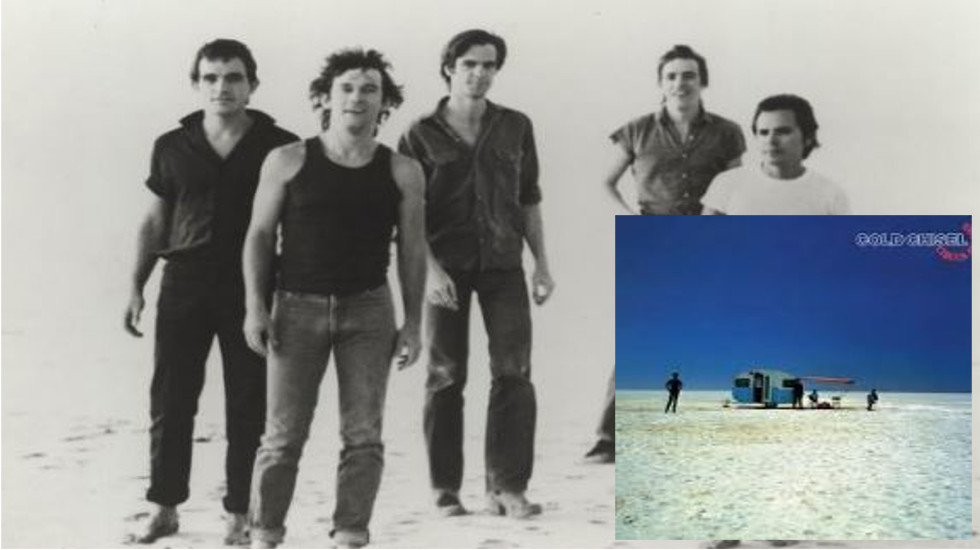
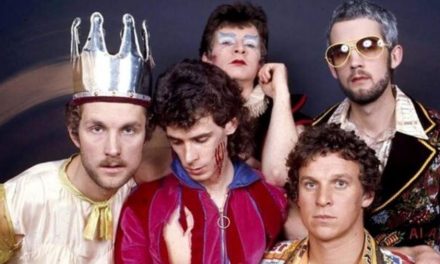

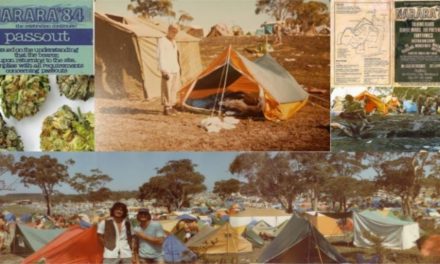
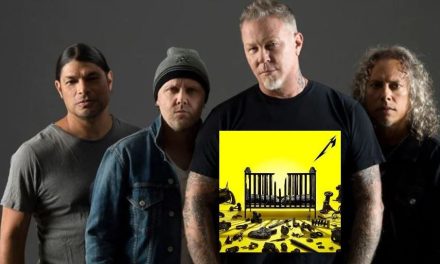
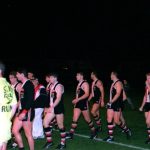





This album is reviewed on the classic rock album by album podcast on Spotify. A Canadian and an American reviewing it. They make some decent points (high praise for Moss’ guitar work) but overall they just don’t get it. They said Forever Now and When The War Is Over were cheese fests. Wot?
In 2.5 hours of yap they only played snippets of each song and none of the guitar solos.
Every song on this album has ripping solos.
My land is ruled by Anglophiles
And forces foreign to me
It was true then , it is true now
Great stuff Rohan.
I can remember my brother David bringing the album home and we played the crap out of it.
Ooh ooh oooooh… that start to Wild Colonial Boy is just superb.
Makes me want to get on a plane and escape the Trump regime and come home!
Rock in!
Cheers, JVT.